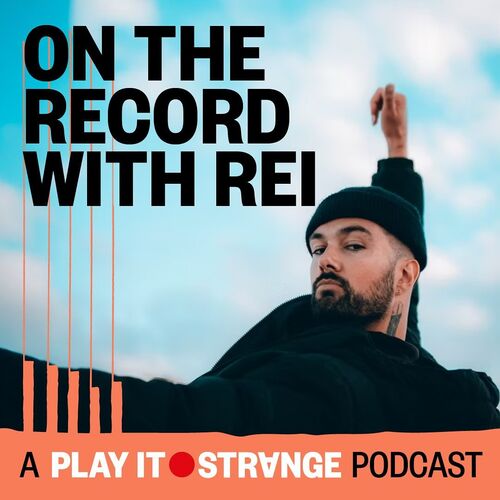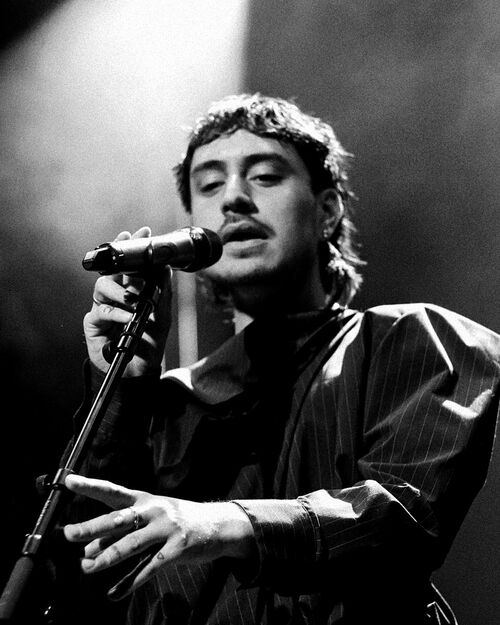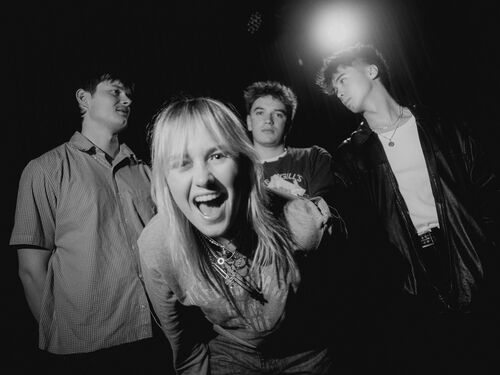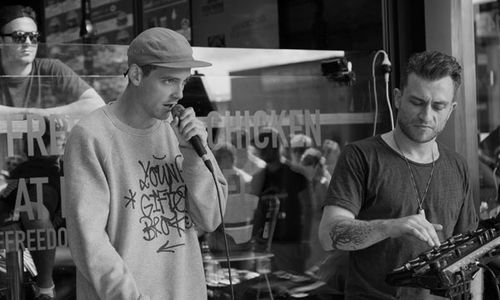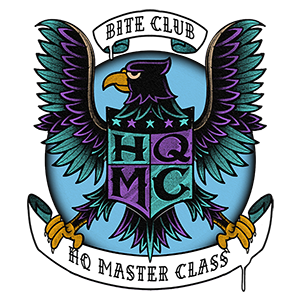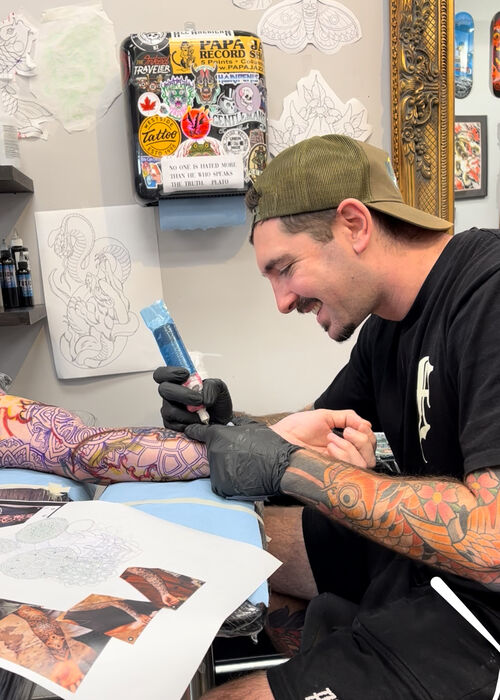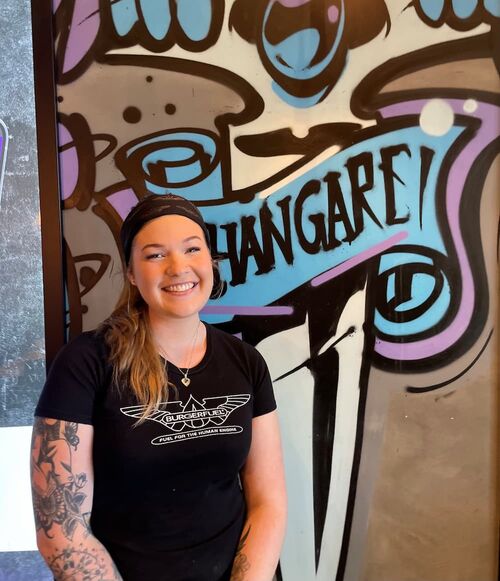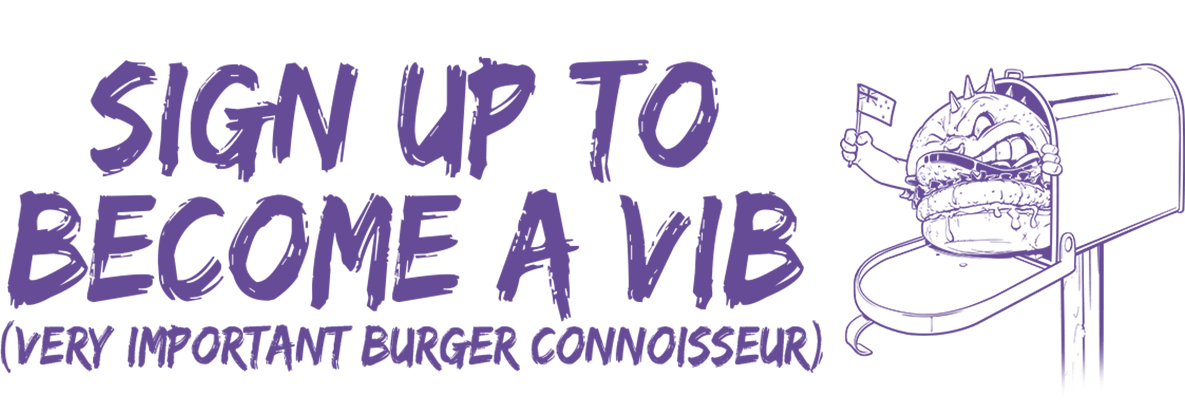The Introduction
Radio BurgerFuel wouldn't be where it is without Scizzorhands. As well as being our resident DJ, Cut Class tutor, Chowdown mix curator and more, he's been ticking away at making this debut album and is stoked to share it with the world.

Elton Noyer aka Scizzorhands has taken up an unfamiliar position on the Radio BurgerFuel couch. Instead of being behind the turntables, headphones on, he is sitting across from Lee Densem, a microphone in his face, talking about his debut album "the introduction" and how he found the transition from straight DJ to producer and musician aswell.
RADIO BURGERFUEL: Scizzorhands, how does it feel on that side of the mic?
Yeah, it does feel a bit strange at this point but I'm pretty sure a couple of minutes though, I'll be sweet. I'm easily adaptable.
Well, it's your debut release today. Do you call it an album? An EP? A mixtape? What are we calling it?
It was going to be an EP, because I don't want it to be my debut album. But as I sent everything away to DRM [his distributor] they informed me that legally it is not an EP, because it's more than six tracks long and more than 30 minutes long.
So, you kind of made an album?
It's an album.
What about a mixtape?
Yeah, I would call it a mixtape, but for me is different because as a DJ, when you make a mixtape, it's a "mixtape". You mix certain songs together. For this, I find it weird calling it a mixtape. So, I guess it's my debut album. Mini album!
How did you get into music? Did you grow up listening?
There's always music around. My mum was an avid collector of records and CDs, so there were always records on the turntables. I guess that's where I learned how to play with records...when I wasn't supposed to be!
I remember one day, I said to my dad when I was really young, "Hey, can I try to scratch with this?" And he's like, "yeah, sweet as". I grabbed Yellow Brick Road, Elton John, I put that on the turntable... at that point, I'd only ever heard scratching and I didn't really know how it was done. I knew that it needed a record and a record player, but I was literally grabbing the stylus and skating along the top of the record, which is what you don't do, that's how you break needles. I mean, that's how it started. There was just music around all the time, I learned how to play piano a bit when I was really young. On my 11th birthday, I got my first drum kit and became this drummer in the school band and was picking up guitar and stuff. When I was almost 14 years old, I was like, "Man, I'm sick of these drums. I just want to rock turntables." So, I sold all that equipment and being young and dumb, I spent it on things like liquor, and steak and cheese pies, but a lot of CDs as well. In hindsight, I wasted a lot of money, but at the same time, a lot of the CDs I bought, is what inspired me to keep going with it.
Did that become your education in a way?
Yeah, it definitely became a lot of my education. DJ Rectangle mixtapes were a definite push on that. Mix Master Mike, Beastie Boys. I mean, there's always like a million things. There was my sister's boyfriend at the time. He was quite a bit older, I think he was like 22 or something when I was 13 years old. We used to ride around in his car, listening to the Rectangle tapes with two 15 inch and subwoofers in the boot, and just doing what you do. That's been my education.
You were talking about Elton John, and you played the guitar and drums. Was there always a hip-hop influence there too?
So, hip-hop...no, in a way. But, yes. We used to ride around in my uncle's truck listening to NWA, Beastie Boys. At that time, the Mortal Combat soundtrack, I definitely remember that. It's a horrible, horrible soundtrack! Led Zeppelin, Black Sabbath. My uncle was definitely into all styles of music, but there was always a little bit of hip-hop thrown in. I think the thing that really turned me on my head was mid-90s, my dad copped a CD and it had 'Chains' by Che-Fu and DLT. I remember the first time hearing something that sounded that gritty, and being like "whoa, what is this?" Then it wasn't till years later that breakdancing became a cool thing. We all started like breaking at school and then the culture started to hold onto me, and I started copying a lot of these "Best Of Hip-Hop" CDs with things like KRS-One, House Of Pain, Noreaga and just all sorts of random stuff on them. It was at that point (about 11, 12 years old) where I started really spending a lot of time at the CD store trying to figure out what the cool things were. Just grab a stack of things, go to the listening booths and flick through, figure out what I wanted to buy. The culture of hip-hop wrangled me in. I was just this random hip-hop kid hanging out with all these rock-heads. It was quite a bizarre thing to think about now. And that's where my eclecticness comes from too, because I still listen to a bit of rock music here and there.
When did DJing actually become a 'thing' for you?
I wanted to buy turntables when I was 13, but I didn't. Later on, I was working as a panel-beater, I was an apprentice at the time and my foreman had just come back from the UK. He and his wife were psytrance DJs and it took them to turn round to me and say, "Just do it. Just go get the gear." It took them to kick my butt a little bit. I was like, "Oh, stuff it. I'm just going to go down to Mix Foundation (well it was known as DMC back then)", and tick up some horrible equipment and just got practicing. A year later I was like man, I'm really, really, really into this.
I went and bought some decent equipment and I just spent a lot of time locked away trying to figure things out. I didn't really have anyone to teach me properly. Al & Cath were definitely a big help in teaching me how to mix. When it came to the scratching side, a lot of how to mix hip-hop together was just self-taught by listening to a lot of Rectangle tapes and figuring out that this is how he does it. It was at that point I realized that a lot of these mixtapes, they had put it in layers on top of layers.
I'm assuming they didn't have YouTube tutorial videos in those days!
Well, no. I think YouTube was around, but there was nothing on there. Every now and again you'd see the odd DJ video pop up but there weren't tutorials there. You could buy a DVD from DJ Qbert - How To Scratch, and it was confusing as hell if you didn't have anyone there to really decipher what he was doing. He was definitely like, "Do this," and then you'd be like, what? He didn't really run right into it. Just the passion of wanting to be able to do it helped.
At this time, were you thinking this is maybe what you want to do with your life? Or were you still thinking this is cool, but I need a job?
Yeah. There was always something there, but at the same time, I never really saw it as "I want to do this for a job". I was more like, this is something that I do after work and if it leads to anything, cool. That's what it always was. Then in 2012 when I won Red Bull 3Style, I thought "I'm okay at this. Let's go a bit harder." Since then I never really looked back. 2016, I quit my job to try and do music full time, and it's been a trip since.
At what stage were you thinking that you wanted to step out from behind the turntables and actually make music?
For maybe six years or something, I bought an MPC when I was 19 or 20, and I tinkered a lot with trying to make beats. I never really took it seriously until I quit my job. I just went harder learning how to make music. It's a lot harder than I thought it was going to be. I was naive when I quit work thinking, well, I know how to play piano a little bit and I know how to do this and I know how to play trombone a little bit. I'll be able to figure it out. But the science of actually being able to put music together and mix it to a degree where it sounds good was a hard thing to do. I've got Beau Jeffries who's been a real saint for me. I just keep hitting him up with questions - how do I do this? How do I do that? At the end of the day, I think you need to have someone to be your master or mentor. Have someone to trickle information as you need it.
Not chuck it all at you at once?
Yeah. That's the thing with the internet or any book you pick up. You can read all this information and go hard on it all you want. I'm not a classroom-type of learner, so I definitely need someone that trickles me information as I learn it. It's funny because now I am a classroom teacher, which is really strange. But I try to have that same sort of approach to teaching - just trickle information as they need it. So that way it actually sticks and stays a lot better.
If someone had said to you 10 years ago that you would have given up panel-beating, gone to work for yourself, and be teaching, would you have told them to stop smoking?!
Yeah. Definitely! Especially, because I was a high school drop out. I was not even there when I was at school. I mean, I was turning up. I never really wagged but it's not like I was mentally there, because I just thought, "I'm going to become a panel-beater." That's what I ended up doing, I guess because I had my mind set to it. But I was young and dumb and thought "I'm going to make more money than these teachers." In hindsight, I was such a dick. I was never a smart guy but I definitely did some smart things. Moving forward through panel beating, buying a house and blah, blah, blah. That actually has set me up to be able to do music full time. It does get hard, I'm not going to lie. Doing music full time is not the easiest thing in the world. I wish I did music from the get-go the whole time, but at the same time, without that early stuff, I wouldn't be in the position I am now to be able to do it the way I am doing it, so I'm thankful for that. But, yeah, had you told me 10 years ago that I was going to be doing music full time, I would have just laughed at you.
The Introduction is out today and you can stream it everywhere. Is it exciting? Is that how you're feeling?
I don't know. I think the exciting thing for me is that I know I've got other music I'm already working on, and now I can focus on that. That's the exciting thing for me. The music that is out now, I've listened to that music a million times.
I'm ready to let it go more than anything. I'm excited to see what people think about it. Negative or positive. At the end of the day, this music I make isn't for anyone. It's music that I literally made for myself. I'm like, cool, I like this. And I've had to put it out so I can forget about it more than anything.
How long have you actually been working on this?
Go On And Cry is a good example, that was three years ago.
Right back from when you first started putting yourself into the project?
Yeah. Money In, Money Out was roughly about the same time. There's been little bits of polishing on them and other bits that have been done within the last year. But I've been more like, okay, let's actually finish this little project and push this out. A lot of it has been just trickling away, bit by bit on each song, based on the fact that I've got to wait for other artists because I can't rap. I guess I could rap one day. I know I'll figure it out. But because I'm not doing any rapping on this project, or any lyric writing, I've got to wait on other people. A lot of people that are on the project, they're really busy people, so you've just got to work within their time. It's not like I've got a million dollars to be like, "Here's 10 grand get your verse written!" I got to be patient with these things, and I'm new to the game too when it comes to actually writing and recording music. So I've also got to understand that these people have got more important projects to be getting done. But it's done now. I hope that moving forward this is a body of work that helps people understand I'm serious about this, and I'm keen to work harder, and work more and put more out.
You talked about the different types of music that you like. It seems like The Introduction is a journey through your mind. It's like you try to pull and tease little bits of all these things out and put it into music.
Yeah, that's exactly what it is, and that's why I recorded The Introduction. "Hey, here's me and this is my wacky mind of where I pull things from." I definitely wanted to stay away from the route of doing anything that sounded too much like anything else. I understand that some of the project is definitely boom-bap, and that's cool. That that is a definitive style. But then there's one song on there, Pray For Better Days, which takes a lot from trap style production, but it's not a trap song. I listen to trap music and stuff like that, so I took a lot of the influence of making that track from that production style. But then it was like, "Hey, now, let's do something crazy with it." Then you've got Most Hours, which is more or less a rock/hip-hop song, which is quite bizarre in itself. It's a weird song to listen to, but at the same time I'm like, yeah man, this is cool, this is different.
Anyone that has heard you DJ, hears you change from rock to hip-hop to old soul classics. That's what you do, right?
Yeah, because for me it's hip-hop too. Going back to the whole idea of hip-hop being a culture thing more than just a music product. Hip-hop has come from a lot of these things, psychedelic rock music. With things like Billy Squier, Queen, anything soul related. Aretha Franklin, anything like that. It's like hip-hop was never a genre where this is real hip-hop and this is a product. Hip-hop has always just pulled from everything and mashed everything together in some way, shape or form. For me, that's what the DJing side of it is supposed to be as well. It's like, if I just play hip-hop songs, I can call myself a hip-hop DJ. But to be a hip-hop culture style DJ, it's about pulling these other things together and just mix and mashing things together that don't necessarily go together. To me, that's what real hip-hop DJing is. Some other people might say different but, that's cool, we'll battle it out.
I read you saying as a kid that you felt you didn't have any cultural identity but through hip-hop you found that identity, that culture. Have you, over the course of making this, discovered anything more about yourself?
I've discovered that I am very eclectic, and just figuring out I'd like to learn more. The biggest thing I've learned is that everything I make in music, I don't try to make the next thing similar to the last thing I made. That comes from a place of wanting to learn more as well. So, the more I'm learning, the more I make new things. Every new thing that comes out has some form of a new thing I've learned.
Whether it comes down to the mixing side of it, or just a way of putting the drums together, or anything. I try and learn new things as I go. My whole approach is a humble one, in the sense that every time I open up Logic, I start with the empty project, no templates, no nothing, and try and have an approach of "this is the first beat I've ever made". I think that's how I can be as creative as possible. Takes a lot longer because obviously, if I make it the same way I made the last one, it would just be a lot quicker and easier. But I'm not about tons of content. I'm more about just making this different than the last one. Let's have a different approach to this. Let's try to do something different.


